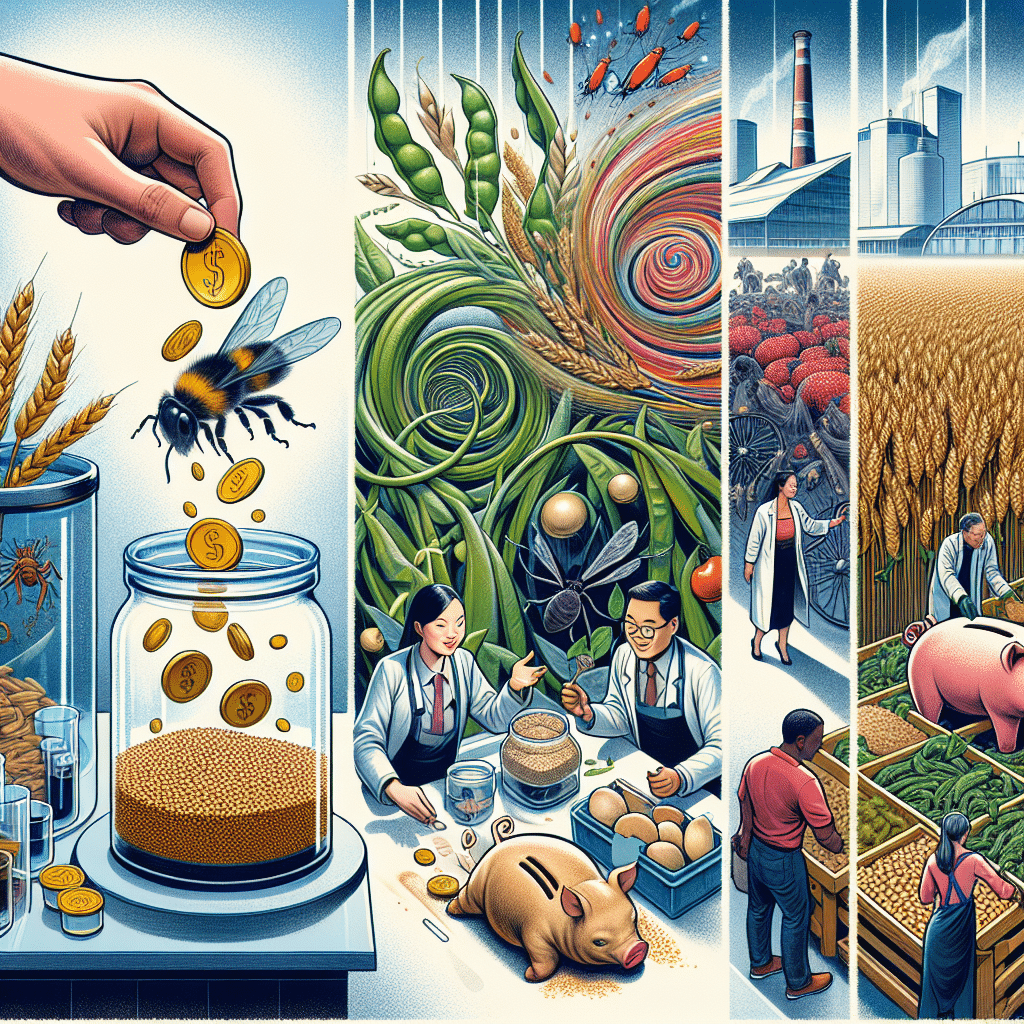Investing in Sustainable Alternative Proteins to Reinvent Food
-
Table of Contents
- Investing in Sustainable Alternative Proteins: The Future of Food
- The Rise of Alternative Proteins
- Environmental Impact of Traditional Livestock Farming
- Investment Opportunities in Alternative Proteins
- Challenges and Considerations for Investors
- Case Studies of Success in Alternative Proteins
- Conclusion: The Future of Food is Sustainable
- ETprotein: Your Partner in Sustainable Protein Solutions
Investing in Sustainable Alternative Proteins: The Future of Food

The global food industry is at a crossroads, facing the dual challenges of feeding a growing population and reducing its environmental footprint. One of the most promising solutions to these challenges lies in the development and investment in sustainable alternative proteins. This burgeoning sector not only offers a pathway to a more sustainable food system but also presents a significant opportunity for investors looking to drive positive change while capitalizing on a growing market.
The Rise of Alternative Proteins
Alternative proteins are derived from sources other than traditional livestock and include plant-based proteins, cultured meat, and proteins from insects or algae. The demand for these proteins is driven by a variety of factors, including concerns about health, animal welfare, and the environment.
- Health-conscious consumers are increasingly aware of the benefits of plant-based diets.
- Animal welfare advocates promote alternative proteins as a means to reduce the reliance on factory farming.
- Environmentalists point to the lower carbon footprint of alternative proteins compared to traditional livestock farming.
Statistics show that the alternative protein market is experiencing rapid growth. According to a report by MarketsandMarkets, the global plant-based protein market size is projected to grow from USD 10.3 billion in 2020 to USD 14.5 billion by 2025, at a Compound Annual Growth Rate (CAGR) of 7.1% during the forecast period.
Environmental Impact of Traditional Livestock Farming
The environmental impact of traditional livestock farming is well-documented. It is responsible for a significant portion of greenhouse gas emissions, land degradation, and water consumption. For instance, the Food and Agriculture Organization of the United Nations (FAO) estimates that livestock accounts for 14.5% of all anthropogenic greenhouse gas emissions.
Investing in sustainable alternative proteins offers a way to mitigate these environmental issues. Alternative proteins typically require less land, water, and energy to produce, and they generate fewer greenhouse gases.
Investment Opportunities in Alternative Proteins
For investors, the alternative protein sector presents a variety of opportunities across the supply chain. These include:
- Startups developing innovative protein sources and production technologies.
- Established food companies expanding their product lines to include alternative proteins.
- Agricultural businesses focusing on the cultivation of protein-rich crops like peas and soy.
- Companies specializing in the processing and distribution of alternative proteins.
Investors can engage with this sector through direct investments in companies, venture capital funds focused on food technology, or public market securities of companies involved in the alternative protein space.
Challenges and Considerations for Investors
While the potential for growth in the alternative protein sector is significant, investors should be aware of the challenges and considerations associated with this market:
- Regulatory hurdles can impact the speed at which new products come to market.
- Consumer acceptance is critical, and tastes can vary widely across different regions and cultures.
- Supply chain complexities must be managed to ensure consistent quality and availability of products.
- Technological advancements are necessary to improve the taste, texture, and nutritional profile of alternative proteins.
Investors need to conduct thorough due diligence and consider the long-term viability and scalability of the alternative protein companies they are interested in.
Case Studies of Success in Alternative Proteins
Several companies have already demonstrated success in the alternative protein market. Beyond Meat and Impossible Foods are two such examples, having gained widespread consumer acceptance and secured partnerships with major food retailers and restaurant chains. These companies have shown that with the right product and marketing strategy, alternative proteins can compete with traditional meat products.
Conclusion: The Future of Food is Sustainable
The shift towards sustainable alternative proteins is more than a trend; it’s a necessary evolution of the food industry. As the world grapples with the environmental impact of traditional livestock farming and seeks to feed a growing population, alternative proteins offer a viable solution. For investors, this sector presents an opportunity to drive positive change while potentially reaping significant financial rewards. The key to success will be in identifying companies that can scale up production, navigate regulatory landscapes, and win over consumers with delicious, nutritious products.
ETprotein: Your Partner in Sustainable Protein Solutions
If you’re looking to invest in or incorporate sustainable alternative proteins into your business, ETprotein is a company worth considering. Their range of organic bulk vegan proteins and L-(+)-Ergothioneine (EGT) products are of the highest quality and cater to various industries, including nutraceuticals, pharmaceuticals, and food and beverage.
ETprotein’s commitment to non-GMO, allergen-free proteins with high purity levels makes them an ideal partner for businesses aiming to meet the growing demand for sustainable and health-conscious food options. By choosing ETprotein, you’re not only investing in quality products but also supporting a more sustainable food system.
About ETprotein:
ETprotein, a reputable protein and L-(+)-Ergothioneine (EGT) Chinese factory manufacturer and supplier, is renowned for producing, stocking, exporting, and delivering the highest quality organic bulk vegan proteins and L-(+)-Ergothioneine. They include Organic rice protein, clear rice protein, pea protein, clear pea protein, watermelon seed protein, pumpkin seed protein, sunflower seed protein, mung bean protein, peanut protein, and L-(+)-Ergothioneine EGT Pharmaceutical grade, L-(+)-Ergothioneine EGT food grade, L-(+)-Ergothioneine EGT cosmetic grade, L-(+)-Ergothioneine EGT reference grade and L-(+)-Ergothioneine EGT standard. Their offerings, characterized by a neutral taste, non-GMO, allergen-free attributes, with L-(+)-Ergothioneine purity over 98%, 99%, cater to a diverse range of industries. They serve nutraceutical, pharmaceutical, cosmeceutical, veterinary, as well as food and beverage finished product distributors, traders, and manufacturers across Europe, USA, Canada, Australia, Thailand, Japan, Korea, Brazil, and Chile, among others.
ETprotein specialization includes exporting and delivering tailor-made protein powder and finished nutritional supplements. Their extensive product range covers sectors like Food and Beverage, Sports Nutrition, Weight Management, Dietary Supplements, Health and Wellness Products, and Infant Formula, ensuring comprehensive solutions to meet all your protein needs.
As a trusted company by leading global food and beverage brands and Fortune 500 companies, ETprotein reinforces China’s reputation in the global arena. For more information or to sample their products, please contact them and email sales(at)ETprotein.com today.












